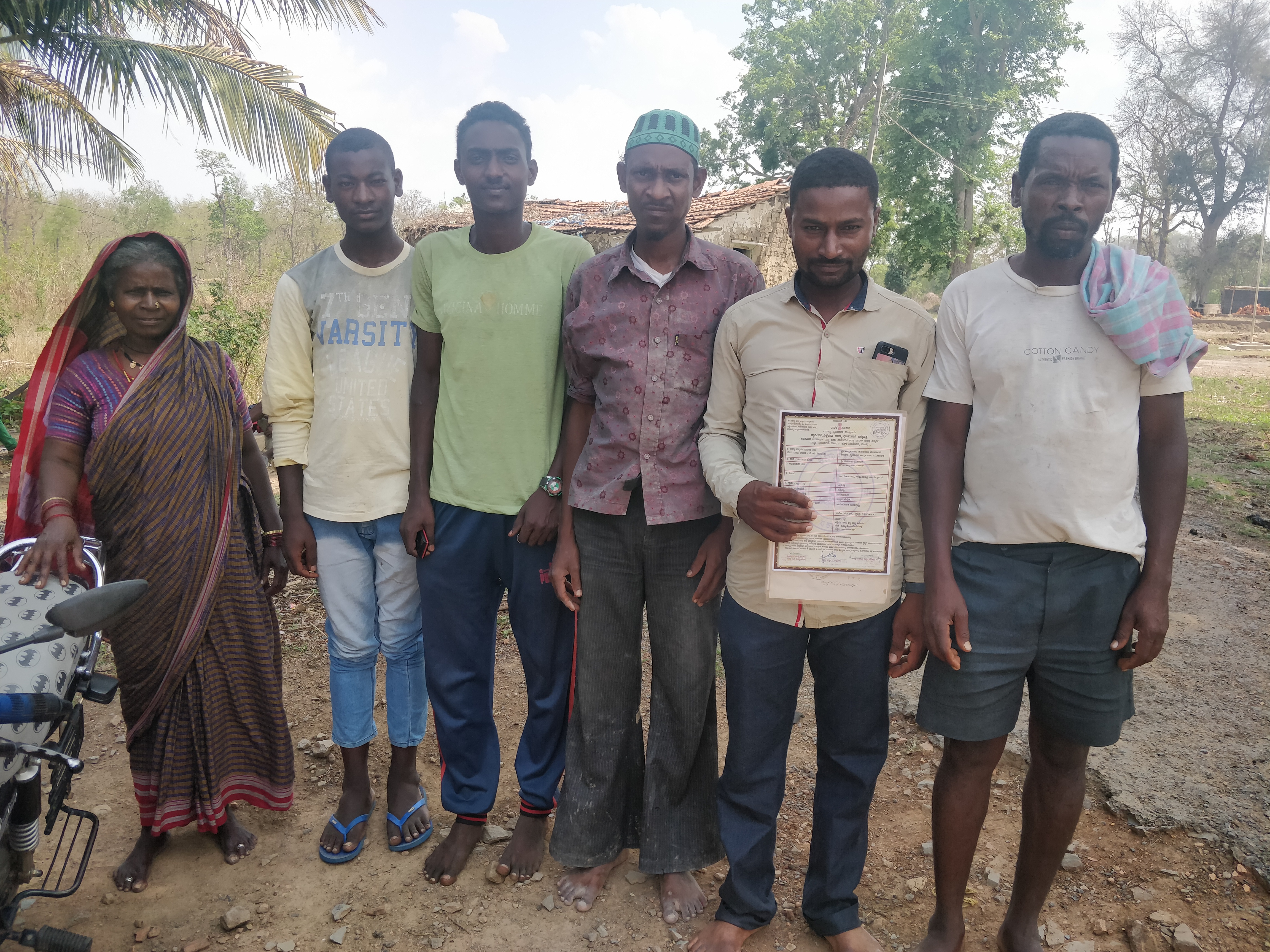It was a scorching April afternoon at Golehalli, a village near Haliyal in the south Indian state of Karnataka. A nikah (Muslim wedding) had just taken place but there was still time for lunch: a generous serving of mutton biryani followed by dessert.
In one corner, Imam Hussain Naik Siddi, Mammasaab Karimsaab Siddi and Allisaab Mammasaab Naik Siddi—three men in their fifties—were engaged in an interesting conversation. The topic: Why won’t the Indian government let us use our land in the adjoining forest?
Videos by VICE
“Maybe they are doing this because we celebrated [former US President] Barack Obama’s return for a second term in America in 2013,” said Imam, referring to the feast and dance that they had organised on Obama’s win in 2013. For them, it was more about how someone sharing their lineage had managed to occupy one of the most powerful positions in the world. “Once, a government official asked me why we’re celebrating an African-American. Maybe the worry is that one day, we’ll be as popular and powerful as him if we are given our rights to a piece of land.”
The Siddis—a tribal community in India whose ancestors are from Africa—are spread across Karnataka, Maharashtra and Gujarat. Over the decades, they have made the forests along the western coast their home. An account I heard in Haliyal describes how the community, brought to the subcontinent as slaves by Indian merchants as early as the third century AD, retreated to the forests to escape harassment during the colonial times. Since then, these forests have been both, their home and a source of livelihood.
For many, survival depends on farming and daily wage labour in and around the forests. In Karnataka, the community—an estimated 47,000 of them—mostly lives around the lush forests in Uttara Kannada. But over the years, their connection to their home has been consistently questioned, and even rebuked, by the government and state forest department. “Back in the ’60s and ’70s, they would ask us how dare we occupy forest land,” said Diyog Siddi, a prominent leader in Haliyal. “Where’s the law that gives you the right to occupy forest land, they’d ask us.”
The law is why we’re here, days before the state goes to the polls today. The Siddis are in the middle of one of the most contentious laws around forests and their inhabitants: the Scheduled Tribes and Other Traditional Forest Dwellers (Recognition of Forest Rights) Act, 2006, commonly known as the Forest Rights Act (FRA). Over the last few months, the FRA is being looked at as a decisive part in the way many forest-dwelling communities across the country will vote in the ongoing Lok Sabha elections.
FRA means an eviction of 1.9 million indigenous people in India
The FRA is designed to protect forest-dwelling communities from being evicted, thereby also securing their livelihood. “The Siddis come under the category of Scheduled Tribes in Karnataka and, according to the law, all we have to prove is that we have been living in the forests prior to 2005,” said Diyog Siddi. “Many of us have submitted a number of documents as proof—voter ID, school certificates, ration cards. But they continue to reject our claims, often saying that the documents we have given are not enough.”

What made the FRA controversial was the February 13 Supreme Court order, which ruled that all those whose claims to the forests have been rejected must be evicted by July 2019. This meant that nearly 1.9 million indigenous people would have to be evicted from the forests across the country. In Uttara Kannada, only 137 claims to their land rights have been approved out of 2,300.
The Supreme Court order, obviously, came under a lot of flak from Adivasi groups and conservationists. Finally, a petition filed by the central government stayed its own order on February 28, and 21 states were told to review the claims they have rejected and provide an explanation to the court by August, 2019.
But Imam Hussain said the government is doing no such review. “If we go to the taluk (subdivision of district) office, they say it is election time and they are forbidden to look at claims right now because of the model code of conduct,” he said. In this village, about 60-odd Siddi families’ claims have been rejected.
The implementation of FRA is shoddy, even arbitrary
Many forest dwelling communities across the country say the FRA is poorly implemented and fraught with bureaucratic hurdles. Many also allege arbitrary rejections.
About an hour away from Yellapur, in Gudundur village, Asansa Abdulsaab Mujavar Siddi still doesn’t know why his claims have been rejected. “They say the documents I have given prove that my family and I have been living here for generations, are insufficient,” he told VICE. “I’ve given them a picture of an old tree, testimony from a village elder—all of which are mentioned in the eligibility criteria under the law—but I still got rejected. Sometimes, if not an outright rejection, they approve a small portion of land and tell us to make do with that.”

In Hosalli, another Siddi village off the highway to Yellapur, a few of them, as part of their forest rights claims, have submitted a copy of a First Information Report filed against them by the local police in 1978, which alleges encroachment of forest land. “You want proof that we were here before 2005? Here’s your own document that proves that you had a problem with me back in the ’70s. Hence I did exist,” says Rockey Siddi. “It’s become such a joke. We keep sending our claims and they keep rejecting it.”
VICE spoke to Nitin Rai from the Bengaluru-based ATREE, an environment research organisation, to understand why this is so. “The central reason for the opposition by the forest department to giving rights to local people is to avoid ceding territorial control over forest land,” said Rai. “The colonial state under the British reserved and notified a vast area of customary forest land for timber extraction. Such an appropriation by state and corporate players continues today for wildlife conservation, tourism, carbon sequestration and other new and emerging commodities under the guise of ecosystem services.”
The threat of eviction will always loom for the Siddis
Even though the plight is similar across the country, the Siddis feel they are being specifically targeted because of their ethnicity.
“When our ancestors ran into the forest, they’d also work in the houses of rich landlords in and around the forest,” said Diyog Siddi. “They worked as slaves, eating leftovers and doing the menial tasks that included cleaning shit. So how dare we attempt to become self-reliant now, right?”
Imam agreed. “Basically, they cannot allow an Obama to be created here at any cost,” he said. “I’ve had forest department officials even say that ‘these Siddis’ have come from outside and are trying to get land here. But we’re as much of an Indian citizen as them or you.”
The anger among the community is palpable and stems from years of being asked to prove their connection to India repeatedly. Juliana Siddi from Haliyal was moved to tears as she spoke of fighting this tag of being an outsider. “When we go to cast our vote, nobody asks us who we are, where we come from or to prove that we have a genuine connection with this land,” she said. “They just want our vote. But when it comes to giving us our rights, suddenly, questions about our identity surface. “Nobody knows the forests better than us. We know which tree is how old, or how to extract honey without disrupting the ecosystem of the forest. We are the ones that are protecting the forest.”

The biggest irony, on top of it all, is that the same forest department allegedly employs the Siddis whenever some work needs to be done, whether it is laying roads or planting saplings. “They pay us a small daily sum for these tasks and since we are being gradually alienated from our land and source of livelihood, we go for these day jobs to earn money,” said Dumgi Sanju Siddi of Hosalli.
In the meantime, threat to their credibility as forest dwellers looms constantly. Imam still remembers how he and other villagers from Golehalli were arrested one afternoon as they were sitting at a masjid close to their plot in the forest. “The allegation was that we were trespassing,” he recalled. “They can always file some false case against us and arrest us. Sometimes they accuse us of stealing forest produce.”

How will all of this impact how the community votes in this election? “We are fed up of all political parties,” Diyog Siddi said. “We’ll vote this time like we always do, but we really want to ask Modi where the good days he promised us really are!”
Follow Archana Nathan on Twitter.




